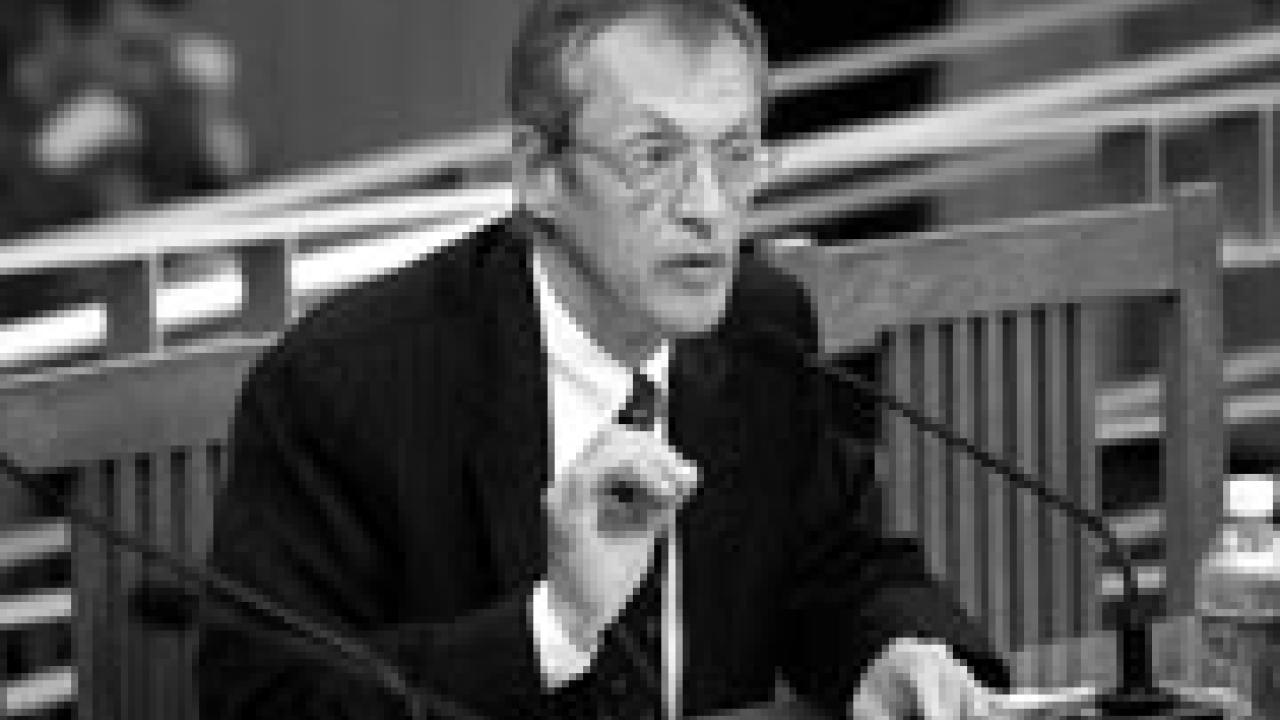In a hearing Feb. 8 before the Senate Education Committee, UC President Robert Dynes and other UC officials explained how the university is dealing with a compensation controversy in the wake of a series of San Francisco Chronicle articles on the issue.
In his remarks, Dynes noted that the UC system had convened a task force on the compensation issue to examine "how our compensation policies and practices need to be revised."
And he told legislators that he took "responsibility for the fact that the University of California has not always met its obligations to public accountability in matters of compensation and compensation disclosure. And I believe I owe you, the members of the Legislature, an apology for that shortcoming."
Simplify, clarify
Dynes said the UC system must do a better job of "simplifying and clarifying our policies, some of which are overlapping, confusing, and contradictory." And he vowed to "demand and expect" full compliance from the institition in any new policies established on compensation.
"I believe we must do a better job of publicly disclosing the compensation of our senior managers in a timely and complete manner," he said.
Dynes testified that the UC system is cooperating with the state Bureau of Audits in its review of its compensation practices, and that a "full accounting" is necessary. While he pointed out that the UC has "never lost sight of our public mission," he acknowledged that it was fair to conclude it had not fulfilled all of its responsibilities that "public mission entails."
He highlighted some of the activities underway to fulfill those responsibilities:
- the regents have launched an independent external audit of senior management compensation;
- the regents have created a new compensation committee to provide oversight of compensation matters on an ongoing basis;
- the regents have adopted a new policy governing separation agreements;
- the UC has adopted, on an interim basis, a rule that any exceptions to employment-related policies for members of the senior management group will require approval by the UC President, in consultation with the regents.
Dynes said, "it is time to use these initiatives to inspire some cultural change at the university to make some fundamental changes so that our institutional culture more fully embraces, at every level, the notion of public responsibility and public accountability."
At the root of the compensation issue, Dynes said, is a recruitment problem. The university is facing significant challenges in today's world of higher education:
"The UC has remained the world's top university, and we also have managed to retain a focus on our public mission of contributing to the economy, health, broad educational attainment, and quality of life of the people of California.
"Providing competitive compensation is critical to what we are doing. It is fundamental to getting and keeping the best people here in California, doing the best work anywhere in the world. They don't come just for the weather, and they certainly don't come for the cost of living. The competition for people is fierce, and the packages we put together — including things like housing assistance and relocation allowances — do make an important difference in recruiting and retaining people.
"A quick look at the national databases compiled by the Chronicle of Higher Education will help you see our compensation levels relative to the market we operate in. Total compensation, as the Chronicle of Higher Education defines it, for university heads around the country includes amounts of $724,000 at the University of Michigan; $720,000 at the University of Delaware; $693,000 for the University of Texas system; and $625,000 at Rutgers University, to cite just a few examples of public institutions. As a point of comparison, the UC president's total compensation, using the Chronicle of Higher Education's definition, is listed at $423,000. The point here is not about me, but about the nature of the competition we face — and that competition is apparent throughout the ranks of the university.
"Failing to compete for the best people at UC would be disastrous for California. It would erode the state's global competitiveness, diminish its research base, compromise California's health and quality of life, and diminish the quality of the educational experience we offer our students."
In conclusion, Dynes said, "the bottom line is that we're going to work to ensure that we resolve these issues in fundamental ways and make these fixes stick."
The full text of his prepared remarks are available at www.universityofcalifornia.edu/news/compensation.
Other speakers
UC Regent Joanne Kozberg also spoke to the committee, describing the goals and objectives of the Task Force on UC Compensation, Accountability, and Transparency, which she co-chairs with former Assembly Speaker Robert Hertzberg. Senior Vice President for University Affairs Bruce Darling and Associate Vice President for Human Resources and Benefits Judith Boyette joined President Dynes for a time at the witness table.
Also addressing the committee were Steve Boilard of the Legislative Analyst's Office, who provided an overview of the issue; David Longanecker, executive director, Western Interstate Commission for Higher Education, who discussed common compensation practices at colleges and universities; and Murray Haberman, executive director, California Postsecondary Education Commission, who covered CPEC compensation studies and current recommendations. Clifford Brunk, chair, UC Universitywide Academic Senate; LaKesha Harrison, president, American Federation of State, County, and Municipal Employees; and Anu Joshi, president, UC Student Association, also testified.
An audio clip of the three-and-a-half hour hearing is available at www.ucop.edu/ucophome/busfin/legislative/ExecCompFeb8.asf
Finally, the UC system has launched a Web site on compensation — it is available at www.universityofcalifornia.edu/news/compensation.
Next step
Regents Chair Gerald Parsky and possibly other UC representatives will testify Feb. 22 before a second hearing on compensation before the Senate Education Committee. Regent Parsky could not attend the Feb. 8 hearing due to a travel commitment. The hearing is scheduled for 9:30 a.m. in Room 4203 of the Capitol.
Media Resources
Clifton B. Parker, Dateline, (530) 752-1932, cparker@ucdavis.edu
